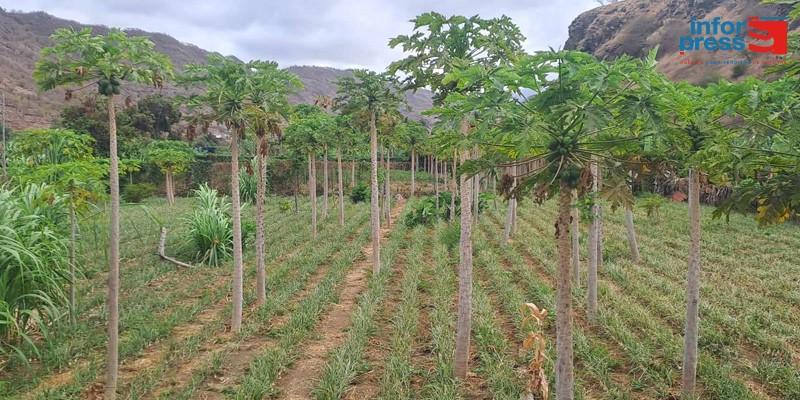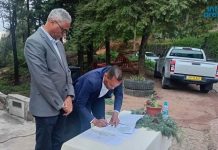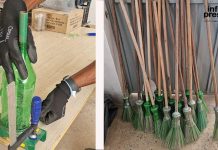
Africa-Press – Cape verde. Farmers in some municipalities in the Santiago Norte region say they are feeling the impacts of climate change, indicating the salinization of land as a “major concern”.
The majority of municipalities in the Santiago Norte region live from primary sector activities, such as agriculture, livestock and fishing. However, in municipalities where there is a sea and which also practice agriculture, farmers are already noticing the presence of land salinization, one of the impacts of climate change.
In the municipality of Santa Cruz, we found, in Ribeira dos Picos, a 37-year-old farmer, Adilson Gonçalves, who said that he had a passion for agriculture since he was a child, having studied until the 8th year of schooling and then decided to abandon his studies to pursue agriculture.
According to the same source, this passion is a rarity, considering that today many young people no longer want to embark on this area because it is “challenging”, but that, in addition to agriculture, he has a passion for livestock and beekeeping (bee farming).
Regarding the changes in the agricultural sector, he said that as a child he walked this river from one corner to another and what he remembers most is abundant water and they did not face any difficulties with water for consumption or irrigation.
“At the time, what we had most was water, where everyone watered due to flooding and there was never a shortage. Now, despite the scarcity of water, we also face the problem of salinity in the land”, said this farmer, highlighting that now, after irrigation, the land turns white, caused by salinity.
“Today it is sad when you see the long distance places that were covered with your feet in the water and now this asset “is very little”. The fountains are gone, the water is dry,” she lamented.
Likewise, he recalled that in the past they did not face problems with the salinity of the land, considering that the water was “very good”, but over time salinity is becoming more frequent every day and is causing several problems in agricultural production and product quality..
“We had more production of bananas, papayas, among other products, but with the salinity of the soil, today, in addition to low production, the quality and flavor is different”, he highlighted, highlighting that crops have been changing to adapt to this new condition, namely, the cultivation of tomatoes, onions and potatoes.
Likewise, João Varela, a 60-year-old farmer from the same municipality, belonging to the Justino Lopes company project, “which was once the largest agri-food complex in the country” confirmed his colleague’s concerns, saying that the issue of salinity has This has been a “huge” concern for farmers, as, in addition to looking for solutions to the lack of water, alternatives have to be sought for the salinity of the land.
In this regard, he announced that they have sought to cultivate products that are more resistant to salinization or in some cases farmers have even given up on plots of land, a situation that according to him has been caused by rising sea levels and consecutive years of drought..
Varela recalled the “fat cow” years when they produced bananas even to export to Portugal because there was a large quantity, but at this moment, in addition to only being cultivating around 50 percent (%) of the land that belongs to the project, lack of water, land salinization, pests and other impacts of climate change have drastically reduced production.
In the municipality of Tarrafal, Colonato farmers have expressed themselves “desperate” with this situation of soil salinization and have been appealing for Government support for some measure to minimize this situation.
The president of the Colonato farmers’ association, João José, reported that at the moment ten wells used to irrigate agricultural properties are saline.
Due to the decrease in water and soil quality, João José said that the quality and quantity of production are also decreasing, making it necessary to take other measures to reverse this situation, highlighting that during high tide times the situation becomes much more complicated.
According to a study by the National Institute of Water Resources Management – INGRH Cape Verde, entitled “Conservation and Sustainable Use of Coastal Aquifers in the Ribeira Seca Hydrographic Basin – Cape Verde, Definition and Intervention Strategies”, salinization is due, “above all , due to the use of brackish water used in irrigation and agriculture, the occurrence of high evapotranspiration and reduced annual precipitation associated with poor drainage”.
Soil salinization is identified as one of the most serious problems associated with climate change. This phenomenon is caused mainly by the greater evaporation of water due to the increase in temperatures and the rise in sea levels, which leads to the injection of salt water into the aquifers. According to a scientific study published in 2021 in the journal Nature, salinization tends to increase drastically in various parts of the world throughout this century, with Cape Verde being one of the most impacted regions.
This report was originally produced for Inforpress, within the scope of the Terra África project, implemented by CFI – French Media Development Agency.
For More News And Analysis About Cape verde Follow Africa-Press





